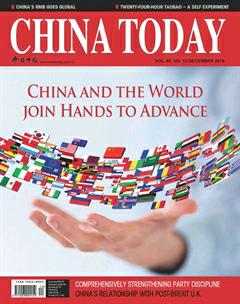LETTERS
I am a middle school student in Gansu Province. My hometown is a poverty-stricken area in western China. But in recent years e-business has brought big changes. I noticed one report in your November issue entitled “E-Commerce Poverty Alleviation in Longnan City.” Just like the article says, for a long time poor areas had no access to highways, electricity and postal services, let alone the Internet. Now, thanks to the e-business policies and development strategy, local people can sell their products online and earn a much better living. I know some of my schoolmates would like to further their studies in the first national public e-commerce school, established in Longnan Teachers College in 2015. Training at e-business enterprises in Zhejiang Province for a six-month vocational training course is also a good option for unemployed college graduates. The Chinese government has set the goal of helping poor people shake off poverty and we are all looking forward to that day.
Yin Lian
China
I am a Chinese citizen living overseas. I heard about the Tibetan epic King Gesar, a world intangible cultural heritage awarded by UNESCO in 2009 as the “Homers Epic of the East,” but have never had a chance to read it or watch it on the screen. The magnificent pictures in your magazine of the Sertar Tibetan Opera instantly attracted my attention. Both Eastern and Western audiences are familiar with Homeric and Indian epics that have been adapted into films and TV series that are well received. Movies can to a certain extent overcome language barriers. So it is a wise decision to bring a work that has been passed down orally for centuries to the silver screen to be viewed by billions of people globally. It should be a blockbuster that could rival The Lord of the Rings.
Annie Jin
U.S.A.
I am an engineer now working in Wuhan responsible for the quality testing of bullet trains. The cuttingedge high-speed railway technologies report in your magazine is my favorite article. The CRRCs debut at the top-level trade fair in Berlin obviously left a deep impression on Western businessmen. Suitable for longdistance passengers, adaptable to different climates and compatible with world railway standards, a train of such versatility could only have been conceived in China, with its vast lands, diverse topography and complex climate. I once read a story online about a Chinese businessman named Miao Tianshun in Warsaw who used to transport his cargoes through water ways, which took him over 40 days. Using China Railway Express now saves him almost one month. Chinas transcontinental trains will help to realize world interconnectivity. The introduction of green and intelligent railways is also good news for Chinese engineers, who can grow together with Chinas high-speed railways.
Jie Deng
China

